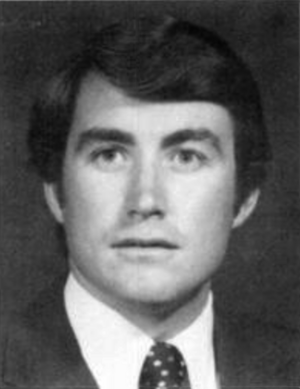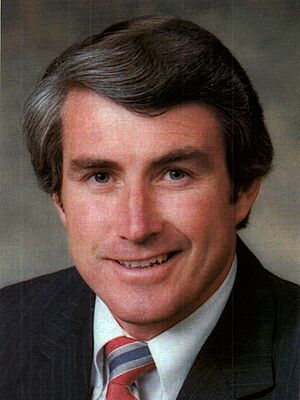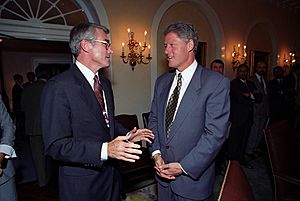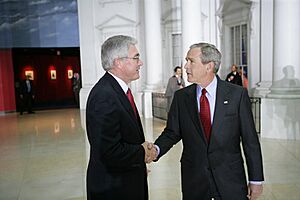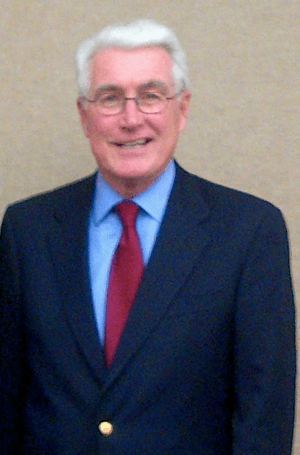Jim Edgar facts for kids
Quick facts for kids
Jim Edgar
|
|
|---|---|
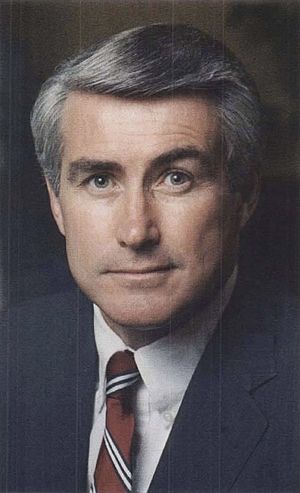
Official portrait, 1989
|
|
| 38th Governor of Illinois | |
| In office January 14, 1991 – January 11, 1999 |
|
| Lieutenant | Bob Kustra (1991–1998) Vacant (1998–1999) |
| Preceded by | Jim Thompson |
| Succeeded by | George Ryan |
| 35th Secretary of State of Illinois | |
| In office January 5, 1981 – January 14, 1991 |
|
| Governor | Jim Thompson |
| Preceded by | Alan J. Dixon |
| Succeeded by | George Ryan |
| Member of the Illinois House of Representatives from the 53rd district |
|
| In office January 12, 1977 – March 8, 1979 Serving with Chuck Campbell and Larry Stuffle
|
|
| Preceded by | Max Coffey Bob Craig |
| Succeeded by | Harry Woodyard |
| Personal details | |
| Born |
James Robert Edgar
July 22, 1946 Vinita, Oklahoma, U.S. |
| Died | September 14, 2025 (aged 79) Springfield, Illinois, U.S. |
| Political party | Republican |
| Spouse |
Brenda Smith
(m. 1967) |
| Children | 2 |
| Education | Eastern Illinois University (BA) |
| Website | Jim Edgar |
James Robert Edgar (July 22, 1946 – September 14, 2025) was an important American politician. He served as the 38th governor of Illinois from 1991 to 1999. Before that, he was a member of the Illinois House of Representatives from 1977 to 1979. He also served as the 35th Secretary of State of Illinois from 1981 to 1991.
Jim Edgar was born in Vinita, Oklahoma. He grew up in Charleston, Illinois. He started his political journey as an assistant to lawmakers. In 1976, he was elected to the Illinois House of Representatives. He won re-election in 1978. In 1979, Governor Jim Thompson chose him to help with legislative matters.
After Alan J. Dixon became a U.S. Senator in 1980, Governor Thompson appointed Edgar as Secretary of State. Edgar won full terms in 1982 and 1986. He won the 1986 election by a large margin.
Edgar successfully ran for Governor of Illinois in 1990. He won against Neil Hartigan. In 1994, he was re-elected by a huge margin. He won almost all counties in Illinois. He chose not to run for a third term in 1998 and then retired from public office.
Contents
Jim Edgar's Early Life and School Days
James Robert Edgar was born on July 22, 1946, in Vinita, Oklahoma. His parents were Cecil and Betty Edgar. His father, Cecil, passed away in 1953. Jim and his two older brothers were then raised by their mother.
Betty Edgar worked at Eastern Illinois University to support her family. Jim later attended this same university. While there, he was the student body president. He earned a bachelor's degree in history in 1968.
Jim became interested in politics when he was young. His parents were Democrats. However, Jim became a Republican in elementary school. He was inspired by the 1952 presidential campaign of Dwight D. Eisenhower.
As a young Republican, Edgar helped with William Scranton's presidential campaign in 1964. He also supported Nelson Rockefeller in 1968.
Starting His Political Journey
After college, Edgar worked as an intern for the Illinois Senate. He then became a personal assistant to Republican leader W. Russell Arrington. Edgar looked up to Arrington as a role model.
Later, Edgar also worked for Illinois House Speaker W. Robert Blair.
Serving in the Illinois House
In 1974, Edgar first tried to become a state representative. He did not win that election. After that, he worked in sales for a short time. He also worked for a group called the National Conference of State Legislatures.
He ran for the same position again in 1976 and won. He was re-elected in 1978.
As a state representative, Edgar worked on important committees. These included committees for money, human resources, and taxes. He was known for his balanced views. This often made him a key vote on many issues.
In 1979, Governor Jim Thompson asked Edgar to join his team. Edgar became the governor's legislative helper. He agreed, hoping it would lead to more opportunities in state politics.
Serving as Illinois Secretary of State
In January 1981, Governor Thompson named Edgar the new Illinois Secretary of State. He filled the spot left by Alan J. Dixon, who became a U.S. Senator. Edgar won re-election in 1982 and 1986. His 1986 victory was one of the largest in Illinois history at that time.
When he became Secretary of State, Edgar kept many employees from the previous leader. He believed that good government was the best way to serve the public. He felt that if employees did their jobs well, their political party did not matter.
During his time as Secretary of State, Edgar worked to make roads safer. He helped pass stronger laws against driving under the influence. This included stricter rules for breathalyzer tests. He also supported a national law to set the legal drinking age at 21. In 1982, President Ronald Reagan appointed him to a commission on safe driving.
In his second term, Edgar helped pass a law for mandatory car insurance in Illinois. This law made sure all drivers had insurance. He also worked to build a new Illinois State Library. His support for the library earned him the nickname "The Reader."
Running for Governor in 1990
On August 8, 1989, Edgar announced he would run for Governor of Illinois. This was after Governor Jim Thompson decided not to seek a fifth term. Edgar was the top choice for the Republican Party. He faced challenges in the 1990 primary election.
In the general election, Edgar ran against Democrat Neil Hartigan. Hartigan was the state's Attorney General. He was a well-known figure in Illinois politics. Hartigan focused on consumer rights and environmental protection.
Edgar campaigned on extending a temporary income tax increase. He promised no new taxes if elected governor. He also highlighted his consistent leadership. He won the election by a small margin.
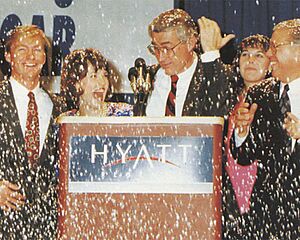
Edgar's victory was helped by his ability to connect with voters. He also gained support from groups that usually voted Democratic. This included many Black voters in Cook County. He also did well among Latino voters in Chicago. These new supporters helped him win a close election.
Governor of Illinois
First Term (1991–1995)
On January 14, 1991, Edgar became Governor of Illinois. He promised to manage the state's money carefully. His team discovered a large budget deficit, meaning the state had less money than it needed. This was the biggest deficit in Illinois history at that time.
To fix the state's finances, Edgar proposed a budget with no new taxes. It included many spending cuts, except for education, which received a small increase. This led to a long budget debate with the Democrat-controlled Illinois General Assembly. Eventually, they agreed on a plan. This plan included most of Edgar's cuts and made the temporary income tax increase permanent.
Edgar also worked to improve the Illinois Department of Children and Family Services. He focused on making sure the department prioritized the best interests of children. He helped pass reforms to prevent child abuse and improve training for caseworkers.
In 1993, Edgar declared several counties disaster areas due to severe flooding. This was during the Great Flood of 1993, one of Illinois' worst natural disasters. He called on the Illinois National Guard and even helped with sandbagging efforts himself.
Addressing the State's Pension System
In 1994, Governor Edgar signed a bill to help the state's pension system. Pensions are savings plans for retired public workers. Before 1981, the state paid pensions as they were due. But this changed, and the system became underfunded.
The new plan aimed to increase the state's pension funding over many years. It set up a schedule for yearly payments. This plan became known as "the Edgar ramp." It included a rule that pension payments would be made automatically. While it was seen as a good step, the plan faced challenges later on. The Illinois pension crisis continues to be an issue today.
Second Term (1995–1999)
In 1994, Edgar won re-election by a large margin against Dawn Clark Netsch. He won almost all of Illinois' counties, including Cook County.
At the start of his second term, Edgar worked on school reforms. He focused on improving Chicago's public schools. These changes helped improve test scores and graduation rates. In 1997, he also worked for education funding reforms. This led to a law that guaranteed minimum funding for every Illinois student. It also started the state's first major school construction program.
During his second term, Edgar continued to improve the state's financial health. He increased education funding and paid off state bills. He also enacted the first income tax relief for Illinois workers in nearly 30 years.
He also worked on protecting land and creating outdoor recreation areas. In 1996, a large area of land became the Midewin National Tallgrass Prairie. This was the first federally protected tallgrass prairie in the U.S. His administration also helped manage the Savanna Army Depot. This preserved natural habitats and helped endangered species.
On August 20, 1997, Edgar announced he would retire from politics. He chose not to run for a third term as governor. He also declined to run for the U.S. Senate.
Edgar supported George Ryan to become the next governor. Ryan was elected in 1998.
After Being Governor
After leaving office, Edgar became a distinguished fellow at the Institute of Government & Public Affairs. This is part of the University of Illinois Urbana-Champaign.
In 1999, he was elected a fellow of the National Academy of Public Administration.
Edgar was the honorary chairman for the Ronald Reagan Centennial Celebration. This event took place at Eureka College, President Reagan's old school. He gave a keynote speech in 2011. He also helped dedicate the Mark R. Shenkman Reagan Research Center.
He was also chairman of the board for the Abraham Lincoln Presidential Library Foundation. He supported the annual Lincoln Bowl tradition. This event celebrates the connection between Abraham Lincoln and Knox College and Eureka College.
In 2016, a firm where Edgar was chairman helped state vendors get payments faster. This firm was called Illinois Financing Partners.
Edgar received the Order of Lincoln in 1999. This is Illinois' highest honor. He was recognized for his work in government.
He was also a resident fellow at the John F. Kennedy School of Government at Harvard University.
Jim Edgar's Political Views
Jim Edgar was known as a moderate Republican.
In 2008, Edgar supported Republican Senator John McCain for President. He also supported Mitt Romney in 2012. In 2016, he publicly stated he would not vote for Donald Trump. He later supported Democrats Joe Biden and Kamala Harris in the 2020 and 2024 presidential elections.
Personal Life and Passing
Edgar married Brenda Smith in 1967. They met while attending Eastern Illinois University. They had two children, Brad and Elizabeth. Edgar was a Baptist.
Edgar was open about his health challenges. These included heart surgeries and other procedures. In February 2025, he announced he had been diagnosed with pancreatic cancer. He was hospitalized in September 2025 due to his cancer treatment. He passed away on September 14, 2025, at the age of 79.
A few months before his death, Edgar said he hoped to be remembered as a "good public servant." He wanted to be seen as someone who "tried to do what he thought was the right thing."
 | May Edward Chinn |
 | Rebecca Cole |
 | Alexa Canady |
 | Dorothy Lavinia Brown |


